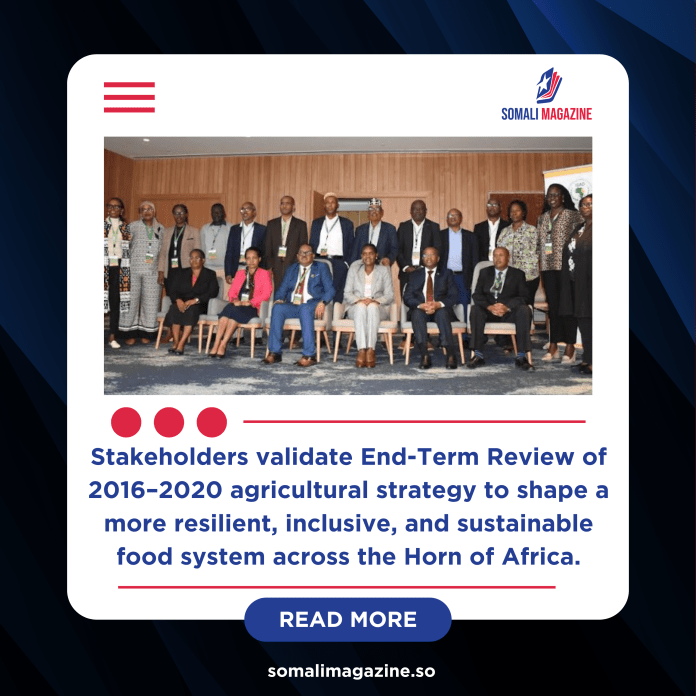Facebook Twitter (X) Instagram Somali Magazine - People's Magazine
The Intergovernmental Authority on Development (IGAD) has held a high-level meeting in Nairobi to review and validate the final assessment of its Regional Agricultural Investment Plan (RAIP) that ran from 2016 to 2020. The meeting brought together experts and key stakeholders from across the region to examine the results of the plan and help shape a new strategy for improving food security.
This event is a crucial step in preparing IGAD’s next major plan — the Regional Agri-Food Systems Investment Plan (RASIP). The new strategy will address serious challenges the region faces, including rising food insecurity, climate change, and cross-border issues.
Dr. Mohyeldeen Eltohami Taha Hamed, IGAD’s Director for Economic Cooperation and Regional Integration, called for greater collaboration among governments, ministries, and development partners. “This is a call to reinforce collaboration between ministries, sectors, and development actors,” he said.
The previous plan, RAIP, was IGAD’s key tool for boosting agriculture and fighting hunger under the African Union’s Comprehensive Africa Agriculture Development Programme (CAADP). It focused on four main goals: managing natural resources sustainably, improving infrastructure for market access, increasing food production, and strengthening agricultural research and knowledge sharing.
Despite its ambitious goals, the plan was implemented during a period marked by numerous challenges — including climate shocks, droughts, the COVID-19 pandemic, desert locust infestations, and regional conflicts. These issues made it difficult for countries to meet the plan’s goals and worsened food insecurity across the region.
“As of 2024, more than 62 million people in the IGAD region face food insecurity,” Dr. Eltohami said. He stressed the need for bold action to reverse this trend and build more resilient food systems.
Dr. Senait Regassa, Project Coordinator of the IGAD Food System Resilience Project, emphasized the importance of agriculture in achieving both food security and regional peace. “When people go hungry, they are more vulnerable to conflict and radicalisation. On the other hand, conflict disrupts food systems, markets, and livelihoods. It’s a two-way street,” she noted.
Dr. Regassa added that investing in agriculture is not only about economic growth — it is also about building peace and stability. She highlighted that national governments must align their budgets and policies with regional goals, especially by meeting the CAADP commitment of allocating at least 10% of national budgets to agriculture.
While the RAIP made some progress, key gaps were identified — especially in funding, coordination among countries, and tracking how resources were used. “Few member states have met the 10 per cent agriculture budget threshold; therefore, we must improve our investment tracking systems and advocate more effectively by showing evidence of how agricultural investments improve lives,” Dr. Regassa said.
The validation meeting in Nairobi provided an opportunity for IGAD to strengthen partnerships with the African Union Commission, development partners, and civil society organisations. The meeting was supported by various IGAD departments, including those focused on agriculture, climate prediction, pastoral development, and drought resilience.
The results of the End-Term Review will play a key role in shaping the new RASIP strategy. This new plan is expected to guide agricultural investment in the region for the next decade and will be aligned with the African Union’s post-Malabo development agenda and the Kampala Declaration of 2025.
Delegates at the three-day meeting, which ends on June 25, expressed hope that better coordination, increased funding, and improved monitoring will bring the region closer to achieving lasting food security and agricultural transformation.
Ultimately, IGAD aims to turn agriculture into a powerful driver of economic growth, resilience, and peace across the Horn of Africa.

